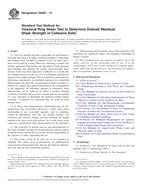Potřebujeme váš souhlas k využití jednotlivých dat, aby se vám mimo jiné mohly ukazovat informace týkající se vašich zájmů. Souhlas udělíte kliknutím na tlačítko „OK“.
ASTM D6467-13
Standard Test Method for Torsional Ring Shear Test to Determine Drained Residual Shear Strength of Cohesive Soils
Automaticky přeložený název:
Standardní zkušební metoda pro torzní Ring smyku Zkouška ke stanovení vyčerpaný Zbytková pevnost ve smyku soudržné zeminy
NORMA vydána dne 1.5.2013
Informace o normě:
Označení normy: ASTM D6467-13
Poznámka: NEPLATNÁ
Datum vydání normy: 1.5.2013
Kód zboží: NS-35247
Počet stran: 7
Přibližná hmotnost: 21 g (0.05 liber)
Země: Americká technická norma
Kategorie: Technické normy ASTM
Kategorie - podobné normy:
Anotace textu normy ASTM D6467-13 :
Keywords:
consolidated, drained test conditions, Mohr-Coulomb strength envelope, reconstituted specimens, residual shear strength, ring-shear test, torsional ring shear test, ICS Number Code 13.080.20 (Physical properties of soil)
Doplňující informace
| Significance and Use | ||||||||||||||||||||
|
5.1 The ring shear test is suited to the relatively rapid determination of drained residual shear strength because of the short drainage path through the thin specimen, and the capability of testing one specimen under different normal stresses to quickly obtain a shear strength envelope. 5.2 The test results are primarily applicable to assess the shear strength in slopes that contain a preexisting shear surface, such as old landslides, soliflucted slopes, and sheared bedding planes, joints, or faults. 5.3 The apparatus allows a reconstituted specimen to be overconsolidated and presheared prior to drained shearing. This simulates the field conditions that lead to a preexisting shear surface along which the drained residual strength can be mobilized. 5.4 The ring shear device keeps the cross-sectional area of the shear surface constant during shear and shears the specimen continuously in one rotational direction for any magnitude of displacement. This allows clay particles to become oriented parallel to the direction of shear and a residual strength condition to develop. 1.1 This test method provides a
procedure for performing a torsional ring shear test under a
drained condition to determine the residual shear strength of
cohesive soils. An intact specimen can be used for testing.
However, obtaining a natural slip surface specimen, determining the
direction of field shearing, and trimming and aligning the usually
non-horizontal shear surface in the ring shear apparatus is
difficult. As a result, this test method focuses on the use of a
reconstituted specimen to measure the residual strength. This test
method is performed by deforming a presheared, reconstituted
specimen at a controlled displacement rate until the constant
drained shear resistance is offered on a single shear plane
determined by the configuration of the apparatus. An unlimited
amount of continuous shear displacement can be achieved to obtain a
residual strength condition. Generally, three or more normal
stresses are applied to a test specimen to determine the drained
residual failure envelope. A separate test specimen may be used for
each normal stress.
1.2 A shear stress-displacement relationship may be obtained from this test method. However, a shear stress-strain relationship or any associated quantity, such as modulus, cannot be determined from this test method because soil extrusion and volume change prevents defining the height needed in the shear strain calculations. As a result, shear strain cannot be calculated but shear displacement can be calculated. 1.3 The selection of normal stresses and determination of the shear strength envelope for design analyses and the criteria to interpret and evaluate the test results are the responsibility of the engineer or office requesting the test. 1.4 The values stated in SI units are to be regarded as standard. The values given in parentheses are mathematical conversions to inch-pound units that are provided for information only and are not considered standard. 1.5 All measured and calculated values shall conform to the guidelines for significant digits and rounding established in Practice D6026. 1.6 This standard does not purport to address all of the safety concerns, if any, associated with its use. It is the responsibility of the user of this standard to establish appropriate safety and health practices and determine the applicability of regulatory limitations prior to use. |
||||||||||||||||||||
| 2. Referenced Documents | ||||||||||||||||||||
|
Odebírejte informace o nově vydaných normách ZDARMA:
Chcete pravidelně odebírat informace o nově vycházejících normách z celého světa a to zcela zdarma?
Přihlašte se k odběru. Vše je velice jednoduché a absolutně ZDARMA.
Na výběr máte vydavatele z celého světa.




 Cookies
Cookies
